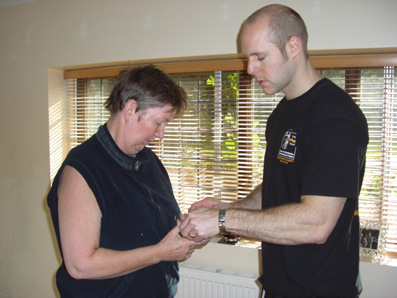ARNI training – October 2009.
Dear Reader,
We returned from our adventure to see Dr Tom Balchin, Director and originator of the Arni method for stroke suvivors last Friday 23rd October. Let me tell you what a worthwhile experience it was and why. I will briefly tell my own story to establish my baseline :
I was age 47 when my major stroke occurred in 2004, one year after Twin Towers, so nine/eleven has additional ramifications for my partner and myself. Initially I benefited from so-called therapy in a rehabilitation centre for young adults before being cast to community care in Northamptonshire, which excommunicates clients as soon as they ‘plateau’. Left to my own devices, it dawned on me that my task was to assume responsibility for my repair and maintenance.
Accordingly I did work at the exercises prescribed by the physioterrorist, especially the knee strengthening ones.
Five years after the accident, I walk unaided inside; outside, I use a stick for any distance or complications . Most of the time, my left arm works hard at a spastic clench which I hide from prying eyes. I resigned from my career in 2008 and now continue as half a housewife (unbelievable for a full on marxist-feminist). So that is my story.
 Now the Arni adventure.
Now the Arni adventure.
- Heard about Arni via the Different Strokes journal and contacted Tom via e-mail.
- We organised a two day meeting at Lingfield.
- Kevin, my partner and I read the blogs, so we were prepared.
- We received a warm welcome, and a chat over coffee in his private suite of rooms
- Tom has a collection of manuscripts for clients to browse. I was interested to read Tom’s story and his psychological approach, as well as the illustrations of the Arni methods.
- Next a couple of trainees arrived for tuition (observation and shadowing), Kate and Carol Anne, who turned out to be an extra benefit in the session as there were more demonstrators (assuming hemiplegic disability) learning on the hoof, like Kevin, for me to observe.
- Now reader, a caution about Tom’s approach. If you are the kind of person who, when faced with the delivery of your first ever commode told Social Services (very sweetly) to stick it where the sun does not shine (thereby preferring the challenge of the stairs to reach the loo), then Tom is your kind of person.
- First of all the method of reaching the floor, other than simply falling over. Don’t worry, just think of those ski-iers crouching before they jump off the hill.
- Unfortunately I did not manage to synchronise all the instructions and neglected to protect my right hand which was bruised in the process of descent. However I did stand up as promised with no-one to help me and proud as punch too.
- I intended to repeat the deed quickly but my hand was sore. Tom has researched, sourced and acquired a collection of devices to assist recovery, including the remarkable Magic Box. This simple tool tricks the brain into believing the nerves in the stroke arm are firing and working the fingers. Yes it does generate activity, although I think the real benefit is in the long term, as with the Arni method itself. Who cares? I’ve got the rest of my life.
- In other words reader, if your are stroked, stuck, and looking for hope. Look no further – go to Lingfield. If in doubt, you can speak to us (ask Tom for contact details).
(The intervention referred to in point 10 is a Mirror Box. See the ARNI Product page. Well done Bryony!!)


